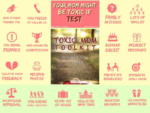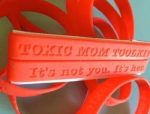Last updated on November 6th, 2019 at 01:18 am
Toxic moms and alcoholism often seem to go together. The challenge for adult daughters is attaining an adult perspective on how much drinking had to do with their mother’s past toxic behavior.
I’ve told this story before: One day my (genius) therapist asked me to describe my mother. What did my mother wear, do and say on a normal day at home?
My mother always dressed to the nines to leave the house. Always full make-up. Always intoxicating, heavy perfumes. I’ve said before, if she could wear furs, cashmere or suede T-straps dance shoes — she would. If she could wear them all at the same time — even better. But at home? There was her full-length pink satin quilted bathrobe with a long belt tied in a bow — not in the middle — but always on the side where the hem met her hipbone. Very Audrey.
She had this robe for a very long time. It went from a prized garment to a house-cleaning rag. She wore it every day for eight or nine years, basically all through my teens. In the end it became her hair dying robe with a shawl of red dye riding her shoulders as a fox stole.
Her jewelry was very important. She never took off her bling-bling diamond wedding set as well as a Russian enameled cocktail ring and a huge pale green jade and diamond right-hand stunner. On a boring Sunday night watching Ed Sullivan on television she wore blush and red lipstick. She spent nearly every sitting moment perfecting her Jordan almond nails. She moisturized her neck and arms as others breathe. She primped like a movie star. She smoked Virginia Slims holding the burning stick far from her face between puffs. She believed smoke gave you wrinkles, not smoking.
My therapist listened with a neutral smile on her face. Then she asked me the following question:
“Did your mother have anything in her hand?”
(This is why we GO to therapists. Why we pay THEM money.)
Me: “She usually had a little pale green glass tumbler, a little drink in her hand.”
Therapist: “A small glass?”
Me: “Yes, very small. Maybe as big as a small apple.”
Therapist: “And what was in it?”
Me: (I had to think.) “Usually a little while wine or vodka?”
My therapist just looked at me.
“She only drank a tiny bit. There was never more than two sips in that glass.”
Blink-blink.
Therapist: “Was that glass ever not in her hand?”
Me: Thinking.
Therapist: “Was it ever empty?”
Me: (Clap of thunder realization.) “My mother had a drinking problem.”
My mother had a drinking problem!
How gentle was my therapist to lead me along that familiar path that I could only see with child eyes? All of my memories of my mother were formed before I had any ability to discern if adults had problems like drinking or depression or other compulsions or bad impulses.
Not only did my mother drink — honey, she DRANK.
Not only did she drink every day, she drank until she was stewed and slurring. It was so common that it seemed normal to me. It was what I grew up with. When she slept during the day, I thought she was tired. When she didn’t wake up, I thought she was tired. She was tired, not hungover. A child doesn’t really know what a hangover is.
What I needed to learn was that so many of my childhood memories included only half the story. It’s not that I wasn’t smart. As an adult, a journalist, a chaplain I can spot folks with substance abuse issues at 100 yards. Those observations are not negative or positive; they are just observations that might inform my interaction. They can often trigger empathy and sympathy. As an adult, I won’t argue with a drunk. As an adult, I’ll let a drunk “explain” things to me but we won’t converse.
If you grew up with someone who had a drinking problem there are a lot of conversations and interactions that might benefit from an adult re-think. I know I’ve spent plenty of time wondering if things said in my home were sober or drunk messages.
Had I known or been told as a child that my mother had drinking issues, what difference would it have made? I did haunt libraries. I might have sought out information on how substance abuse affects families. A school counselor could have told me about Alateen or Al-Anon programs.
There’s a questionnaire at www.al-anon.alateen.org that might surprise you. The title is: “Did you grow up with a Problem Drinker?” I started laughing when I saw how many of the descriptions captured my experience. I’m listing a sampling of the bullets, not all.
You may have grown up with a problem drinker if:
- You fail to recognize your own accomplishments.
- You fear criticism.
- You overextend yourself.
- You constantly seek approval and affirmation.
- You feel more alive in the midst of a crisis.
- You care for others easily yet find it difficult to care for yourself.
- You isolate yourself from other people.
- You respond with fear to authority figures and angry people.
- You often mistrust your own feelings and the feelings expressed by others.
How did you do? Did you discover something? Should you spent some time considering this topic and how it applies to your family? If it doesn’t apply to you and your mom, could it apply to your mom and her mom?
My hope for this post is that it illustrates that you can’t always figure out family history on your own. It’s important to discuss your memories with a trusted friend or therapist. I’ve always had a hard time opening up to others – – especially about my childhood. But I’ve found the more I seek to understand my life and enlist others to help me on that journey, the happier I am.
 Until next Sunday, BEE HAPPY.
Until next Sunday, BEE HAPPY.
Rayne Wolfe’s dream is to write her first book Confessions of an Undutiful Daughter by the end of 2011. She completed her dream journey May of 2011 on 8WD after a year living her dream. You can find her at Toxic Mom Toolkit on Facebook.

Enjoy this special 8WomenDream Guest Contributor story submitted by new and experienced big dreamers throughout the world, edited and published to capture a dream perspective from different points of view. Do you have a personal dream story to share with 8WomenDream readers? Click here to learn how to submit dream big articles for consideration.
Note: Articles by Guest Post Contributors may contain affiliate links and may be compensated if you make a purchase after clicking on an affiliate link.




